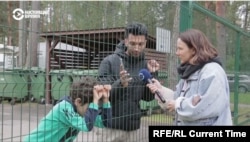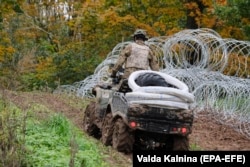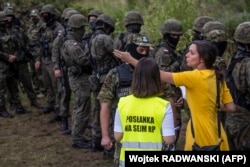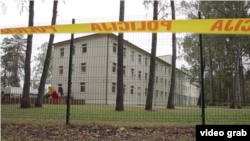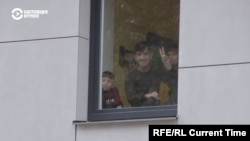Two months ago, Iranian Amir Chani paid smugglers his entire savings for a slim chance at a free life in the European Union after a lifetime under Iran’s “dictatorship.” But, after crossing from Belarus through a forest into EU member Latvia, Chani finds his life at a standstill.
As a resident at the Mucenieki migrant detention center, located a few kilometers outside of the Latvian capital, Riga, he can no longer leave the center’s fenced-in, police-guarded territory. An outbreak of COVID-19 recently led to the imposition of a quarantine, which ended such privileges.
Instead, his wife and he must wait in the center for at least several months as officials verify their documents and attempt to confirm their claim to political asylum. If the couple is denied, they will be returned to Iran.
“It’s not important to me which European country I’m in. Comfort is important to me,” Chani said, speaking with Current Time through the barred metal fence that surrounds the Mucenieki center. “I didn’t request refuge in Latvia in order to earn money here. I don’t have any expectations. I just want to feel safe.”
Chani, who said he paid smugglers €12,000 ($14,033) for the trip onto Latvian territory, is one of some 262 migrants, primarily from Iran and Iraq, placed in the center after illegally entering Latvia from its eastern neighbor, Belarus.
With a population of less than 2 million people, Latvia, like its neighbors, Lithuania and Poland, has prioritized preventing its number of detained illegal migrants from increasing further.
On September 28, the Latvian Defense Ministry announced that it had erected 1.7 kilometers of a temporary, multi-layer, barbed-wire fence along the Latvian-Belarusian border. The fence’s initial section was installed in a part of the country, Kraslava County, where most illegal migrants cross the border, Latvian Public Broadcasting reported.
Compared with Lithuania and Poland, though, Latvia has had less trouble with the flood of illegal Afghan, African, and Middle Eastern migrants. Overall, according to the Latvian State Border Guard, 384 migrants have been detained for illegally entering Latvia in 2021 – a number that is less than 10 percent of the migrants who allegedly have attempted this summer to cross into Lithuania and Poland from Belarus.
Nonetheless, like Lithuania and Poland, Latvia has declared a state of emergency that allows border guards to refuse to admit would-be applicants for asylum.
Since that August 10 decision, the border guard states, only 32 of 1,206 individuals who attempted to cross the border illegally have been allowed into Latvia for humanitarian reasons, Latvian Public Broadcasting reported on September 17.
As Belarus will not allow such individuals to reenter, those unable to enter Latvia face an uncertain future. The UNHCR, the United Nations’ refugee agency, has expressed “growing concern” that many of these migrants to Latvia, Lithuania, and Poland are left “in dire situations, exposed to the elements, suffering from hypothermia …”
In August, Reuters witnessed a standoff between some 30 migrants, and Latvian border guards that lasted for hours until the group, which included toddlers, returned into Belarus to seek food and shelter from the cold.
A minimum of five such individuals have died so far trying to cross from Belarus into Lithuania and Poland.
In an August 25 decision, the European Court for Human Rights ordered Latvia and Poland to provide “food, water, clothing, adequate medical care and, if possible, temporary shelter” to asylum applicants left in no-man’s-land between their countries and Belarus.
While attempting to address these humanitarian concerns, Latvia, a popular site of asylum for Belarusian dissidents, believes it is essentially under attack by Belarus. “It is pretty obvious that this is not a conventional threat,” commented Latvian Foreign Minister Edgar Rinkevics during a September 13 meeting with his Estonian, Lithuanian, and Polish counterparts in Riga to discuss regional security concerns.
Polish Prime Minister Mateusz Morawiecki appears to have little doubt that Russia, too, plays a role in the migrant crisis, which he described at a September 20 press conference as a “well-organized action from Minsk and Moscow.” Russia and Belarus currently are accelerating plans for the two countries’ economic “integration” and stronger military-security coordination.
Belarusian political scientist Pavel Usov also believes Russia, Belarus’ strongest ally, could “weaponize” such migrants against the EU.
Usov, who currently lives in Poland, contends that Russian President Vladimir Putin wants
to prompt the EU to relax its sanctions against Russia in exchange for Moscow “solving the Lukashenka problem” – a reference to Alyaksandr Lukashenka, the official winner of a 2020 presidential election widely deemed fraudulent both within Belarus and without.
The European Union, however, has not publicly indicated that it desires Moscow to intercede with Minsk, although Russian President Vladimir Putin, who declined any such role, has claimed as much. On September 29 EU Home Affairs Commissioner Ylva Johansson described Belarusian President Alexander Lukashenko as “not a partner we are ready to cooperate with.”
Lukashenka has made plain that the Belarusian government will allow illegal migrants to transit its territory into the European Union in response to what he considers to be a Western campaign to end his de facto rule. One video released by Lithuania’s border guard on September 9 shows an apparent Belarusian military vehicle dropping off a group of individuals near the Lithuanian border.
Latvia, Lithuania, and Poland are consulting with NATO as well as with the European Union about the most effective form of response to the flood of illegal migrants.
Meanwhile, with nothing to do but wait, many of the migrants in the quarantined Mucenieski center are becoming restless. Recently, some tried to break down a fence keeping them within the center’s grounds. The scuffle with police guards only led to the deployment of more law enforcement.
Since mid-August, 85 migrants, primarily from Iraq, have escaped from the center since mid-August, according to Latvia’s State Border Guard. Half of these individuals were later detained on the Polish-Lithuania border and placed in centers run that do not allow freedom of exit and entrance.
Belarusian refugee Nasta Zakharevich, who spent over a month in quarantine at Mucenieki, can understand the residents’ frustrations with their living conditions.
The quarantine Zakharevich experienced made clear that “the government had absolutely no plan for such a circumstance,” she said. “No one knows who’s responsible for what.”
Employees who came to work the day the quarantine was imposed found themselves confined to the center as well for a month, she claimed.
Yet the illegal migrants themselves will be the ultimate victims of Latvia, Lithuania, and Poland’s ongoing battle with Belarus, believes Usov. He described the migrants as “hostages” to other countries’ interests.
“We should understand that people in these big, geopolitical chess games have no significance at all -- neither the people, nor the number of people who will die,” Usov said.
-- With additional reporting from AP, Baltic News Network, and Latvian Public Broadcasting





